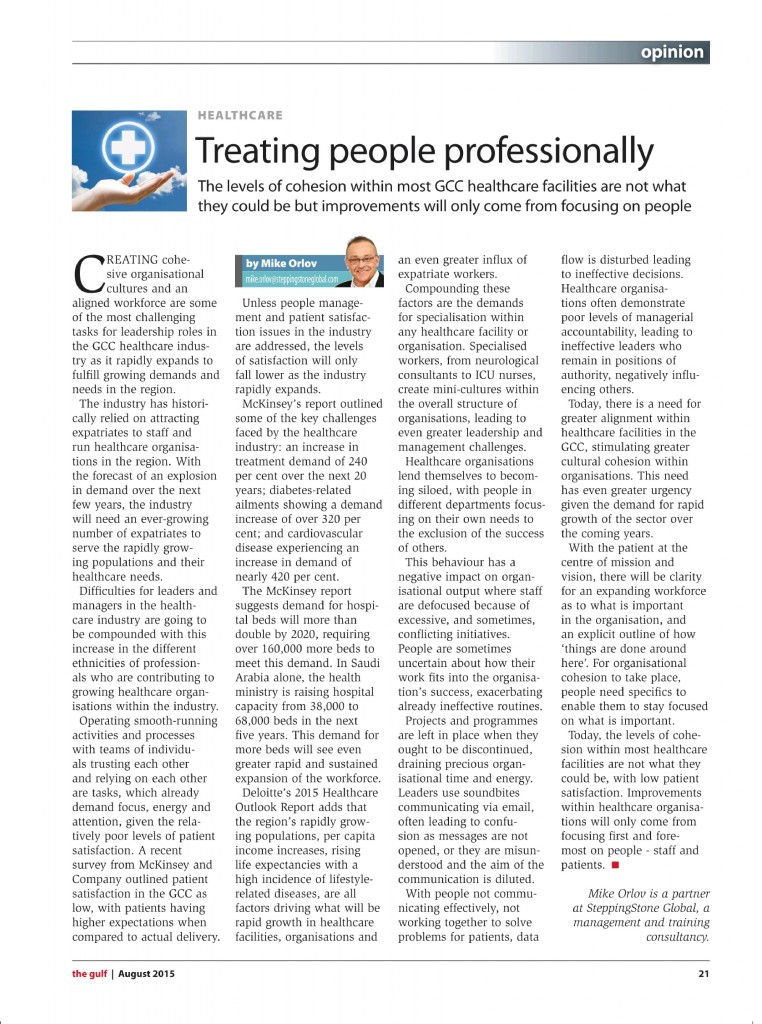Creating cohesive organisational cultures and an aligned workforce are some of the most challenging tasks for leadership roles in the GCC healthcare industry as it rapidly expands to fulfill growing demands and needs in the region.
The industry has historically relied on attracting expatriates to staff and run healthcare organisations in the region. With the forecast of an explosion in demand over the next few years, the industry will need an ever-growing number of expatriates to serve the rapidly growing populations and their healthcare needs.
Difficulties for leaders and managers in the healthcare industry are going to be compounded with this increase in the different ethnicities of professionals who are contributing to growing healthcare organisations within the industry.
Operating smooth-running activities and processes with teams of individuals trusting each other and relying on each other are tasks, which already demand focus, energy and attention, given the relatively poor levels of patient satisfaction. A recent survey from McKinsey and Company outlined patient satisfaction in the GCC as low, with patients having higher expectations when compared to actual delivery.
Unless people management and patient satisfaction issues in the industry are addressed, the levels of satisfaction will only fall lower as the industry rapidly expands.
McKinsey’s report outlined some of the key challenges faced by the healthcare industry: an increase in treatment demand of 240 per cent over the next 20 years; diabetes-related ailments showing a demand increase of over 320 per cent; and cardiovascular disease experiencing an increase in demand of nearly 420 per cent.
The McKinsey report suggests demand for hospital beds will more than double by 2020, requiring over 160,000 more beds to meet this demand. In Saudi Arabia alone, the health ministry is raising hospital capacity from 38,000 to 68,000 beds in the next five years. This demand for more beds will see even greater rapid and sustained expansion of the workforce.
Deloitte’s 2015 Healthcare Outlook Report adds that the region’s rapidly growing populations, per capita income increases, rising life expectancies with a high incidence of lifestyle-related diseases, are all factors driving what will be rapid growth in healthcare facilities, organisations and an even greater influx of expatriate workers.
Compounding these factors are the demands for specialisation within any healthcare facility or organisation. Specialised workers, from neurological consultants to ICU nurses, create mini-cultures within the overall structure of organisations, leading to even greater leadership and management challenges.
Healthcare organisations lend themselves to becoming siloed, with people in different departments focusing on their own needs to the exclusion of the success of others.
This behaviour has a negative impact on organisational output where staff are defocused because of excessive, and sometimes, conflicting initiatives. People are sometimes uncertain about how their work fits into the organisation’s success, exacerbating already ineffective routines.
Projects and programmes are left in place when they ought to be discontinued, draining precious organisational time and energy. Leaders use soundbites communicating via email, often leading to confusion as messages are not opened, or they are misunderstood and the aim of the communication is diluted.
With people not communicating effectively, not working together to solve problems for patients, data flow is disturbed leading to ineffective decisions. Healthcare organisations often demonstrate poor levels of managerial accountability, leading to ineffective leaders who remain in positions of authority, negatively influencing others.
Today, there is a need for greater alignment within healthcare facilities in the GCC, stimulating greater cultural cohesion within organisations. This need has even greater urgency given the demand for rapid growth of the sector over the coming years.
With the patient at the centre of mission and vision, there will be clarity for an expanding workforce as to what is important in the organisation, and an explicit outline of how ‘things are done around here’. For organisational cohesion to take place, people need specifics to enable them to stay focused on what is important.
Today, the levels of cohesion within most healthcare facilities are not what they could be, with low patient satisfaction. Improvements within healthcare organisations will only come from focusing first and foremost on people – staff and patients.
Mike Orlov is a partner at SteppingStone Global, a management and training consultancy.

